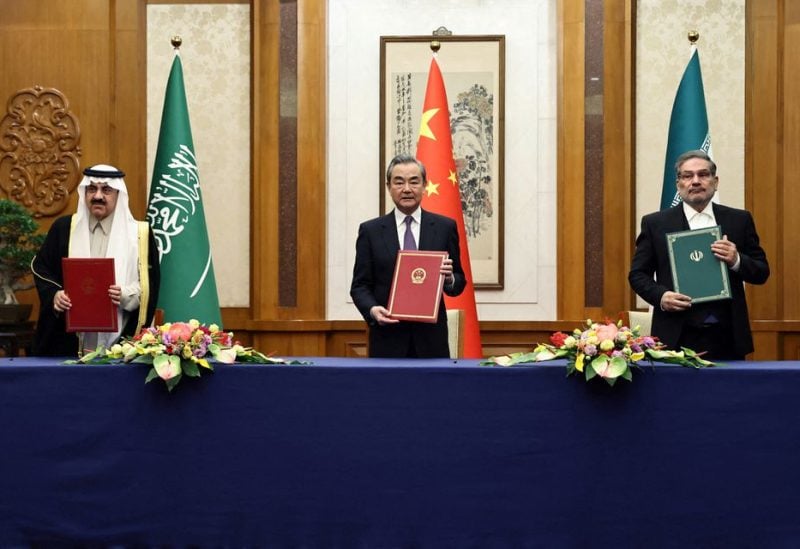
Wang Yi, a member of the Political Bureau of the Communist Party of China (CPC) Central Committee and director of the Office of the Central Foreign Affairs Commission attends a meeting with Secretary of Iran's Supreme National Security Council Ali Shamkhani and Minister of State and national security adviser of Saudi Arabia Musaad bin Mohammed Al Aiban in Beijing, China March 10, 2023. China Daily via REUTERS
Iran had been attempting to reestablish connections with its long-time rival Saudi Arabia, an Arab heavyweight and oil giant, for two years in an effort to break its political and economic isolation.
Ayatollah Ali Khamenei, the supreme leader of Iran, became impatient with the sluggish progress of bilateral negotiations last September and called a meeting of his team to examine ways to speed things up, according to two Iranian officials who spoke to Reuters. This prompted China to get involved.
Beijing’s secret role in the breakthrough announced last week shook up dynamics in the Middle East, where the U.S. was for decades the main mediator, flexing its security and diplomatic muscles.
“The Chinese showed willingness to help both Tehran and Riyadh to narrow the gaps and overcome unresolved issues during the talks in Oman and Iraq,” said an Iranian diplomat involved in the talks.
The deal was struck after a seven-year diplomatic rupture. For Saudi Arabia, a deal could mean improved security. In 2019, the kingdom blamed Iran for attacks on its oil installations that knocked out half of the its supply.
Iran denied involvement. Yemen’s Iran-aligned Houthi group claimed responsibility for the attacks.
Saudi Arabia’s Finance Minister Mohammed Al-Jadaan has said that Saudi investments into Iran could now happen quickly.
Saudi Arabia cut ties with Iran in 2016 after its embassy in Tehran was stormed during a dispute between the two countries over Riyadh’s execution of a prominent Shi’ite Muslim cleric.
Hostility between the two powers had endangered stability in the Middle East and fuelled regional conflicts including in Yemen, Syria and Lebanon.
Asked whether the Saudi-Iran deal might fray, Wang Di, a senior Chinese diplomat involved in the talks in Beijing, told reporters the rapprochement was a process without expectations that all issues would be solved overnight.
“The important thing is for both sides to have the sincerity to improve ties,” he said, according to state Xinhua news agency reporter Yang Liu on Twitter.
Saudi Arabia, Washington’s most important Arab ally, began exploring ways to open a dialogue with the Islamic Republic two years ago in Iraq and Oman, said a Saudi official.
This lead to a critical moment in December, when Chinese President Xi Jinping visited Riyadh. In a bilateral meeting with Crown Prince Mohammed bin Salman, the president expressed his desire to broker dialogue between Saudi Arabia and Iran.
“The crown prince welcomed this and promised to send, for us to send to the Chinese side, a summary of the previous rounds of dialogue, a plan on what we think on how we can resume these talks,” said the Saudi official.
In February, Iran’s President Ebrahim Raisi visited Beijing and the Chinese forwarded Riyadh’s proposals that were accepted by the Iranian side, the official added.